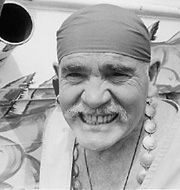HAS SEATTLE LOST its soul?
That’s the “angels on the head of a pin” question of our time. We sit around discussing what kind of soul we have and where it’s residing, as if there’s no doubt that such a thing exists. But do cities really have souls?
Is livability a characteristic of the soul? Is niceness? Is world-class this or that? Is congestion a condition of the soul or the roads? Are our problems real or emblematic? Has our civic identity, whatever that is, really changed, or are current conditions the inevitable result of what we’ve been doing for decades, if not centuries?
And if we’ve lost our soul, shouldn’t we be able to define the time when we had it? When, exactly, did Seattle last see its soul intact?
Was it when the Dennys and the Borens landed and declared their intention to recreate New York City? Was it during Seafair ’56 or Century 21? Was it before or after the city engineers washed away the hills, chopped down the old growth, and dug the canals? Was it when Dave Beck’s union goons were pounding heads? Was it when Skid Road was lined with winos, hookers, and bums? Was it when we lynched and expelled Chinese residents or put the local Japanese in prison camps? Was it when we planned to build the SST, or when we didn’t build it? Was it when we were “Queen City,” “the Jet City,” “the Emerald City,” or no city at all? Was it when we built the Dome or blew it up? Was our soul dancing in the Garden of Allah or hiding in the closet with grandpa’s Klan robes?
CITIES HAVE CHARACTER. On some days, they seem to have moods—an energy you can sense. They can cast spells. But I don’t think they have a soul. If anything, they contain multitudes, a Whitmanesque complexity. One person’s declining livability is another’s low-cost housing; one race’s halcyon days are another’s nightmare. A neighborhood’s gentrification means one thing for dot-com yuppies, another thing for artists, yet another for the homeless or sports fans. One person’s sprawl is another person’s Greater Seattle.
To think that urban life, in all its diversity, must add up to a single, quantifiable essence seems the height of arrogance. To try to hang a single identity around the city’s neck seems ultimately untenable, unless you want to create a city where racial, economic, cultural, and ethnic homogenization is complete: one city, one people. Do we really want a civic gene pool the size of Iceland’s?
Soul-searching can produce positive results even if there is no soul to find, just as no one has ever found the Philosopher’s Stone or Holy Grail, but the search for one produced modern chemistry, while the search for the other created a wonderful mythology. And Seattle, part New Age city on the hill that it is, cannot get enough of such quests. I mentioned to a former Weekly colleague in Chicago that Seattle was going through another identity crisis, that The Seattle Times, KUOW, and NPR had lately been poking at the Seattle soul question. “Seattle is always doing that,” she said. “Other cities don’t.”
So is that a defining characteristic, a tendency to publicly invent and reinvent the city in the collective mind, and to look to each other for reassurance? As the downtown promoters tout the fact that we have world-class amenities and sophistication, we seek to reassure ourselves of our substance by reminding ourselves aloud of all that we have, like the nouveau riche counting its new money. By that calculation our soul is simple: It’s the stuff we have and the stuff we don’t have anymore.
WE TAKE ON TOO MUCH, looking for Seattle’s soul. I feel much more content to think I live in a city of downtown and suburbs, of over a million souls, a city loosely defined; a city like a river delta fed by forces that start as snowmelt and follow millions of rivulets and creeks to become a river that empties onto the lands around Elliott Bay. This isn’t a city that flows outward, despite its sprawl, but a city into which things flow from every direction. Trying to pin down our soul is like trying to pin down a point on that river.
So the debate needs to come down to particulars and examine what moves different segments of the city: to revive, if you will, a kind of civic and regional animism that sees all the components of the city as alive and dynamic.
Because to believe in a single civic soul is to believe in something tangible and fixed, a commodity ready for trading and ripe for selling. It becomes an icon to be burnished, the subject of magazine covers and convention brochures, and sets us on the path to Disneyfication. Well, farther down that path.
It suggests a mutual consent to one present, one past, and one future.
No, Seattle doesn’t have a soul. We can do better than that.







